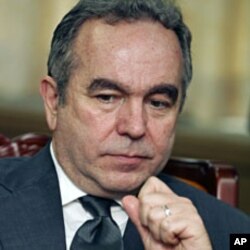Top officials from the United States, South Korea and Japan met Tuesday in Washington for talks focusing on restarting stalled six-party negotiations on North Korea's nuclear program.
Assistant U.S. Secretary of State Kurt Campbell and special North Korea envoy Glyn Davies hosted Lim Sung Nam, South Korea's top negotiator to the talks, and his Japanese counterpart, Shinsuke Sugiyama.
The diplomats gathered to coordinate the next steps in the six-party talks for the first time since the death last month of North Korea's leader Kim Jong Il.
In 2009, North Korea walked out of the six-party negotiations, which are intended to convince Pyongyang to abandon its nuclear program in exchange for economic aid.
The United States, China, Russia, Japan and the two Koreas are participants in the talks.
Before his death in December, Kim Jong Il expressed a desire to return to the talks. But he rejected preconditions set by U.S. officials that North Korea must suspend its uranium enrichment program and allow U.N. inspectors back into the country.
Several news reports last month indicated that North Korea was poised to announce a deal with Washington to suspend its uranium enrichment program in exchange for urgently needed food aid.
But Mike Chinoy, a North Korea analyst at the University of Southern California, says it is unclear whether North Korea's new leader, Kim Jong Un, is willing to make concessions as he attempts to consolidate power following his father's death.
"The question is really whether the North is ready to pick up where things left off when Kim Jong Il died," Chinoy. "There are some signs that suggest he might. Other signs are not so clear. It may be too early to tell."
Chinoy says if the reported deal between the U.S. and North Korea is still negotiable, it could conceivably open the door for six-party talks to resume in the coming months.
The U.S. denies that its offer of food aid is contingent upon political concessions. The U.S. suspended its food assistance program in early 2009, partially because of concerns the food was being diverted to North Korea's military or members of its political elite.
Some information for this report was provided by AFP.




